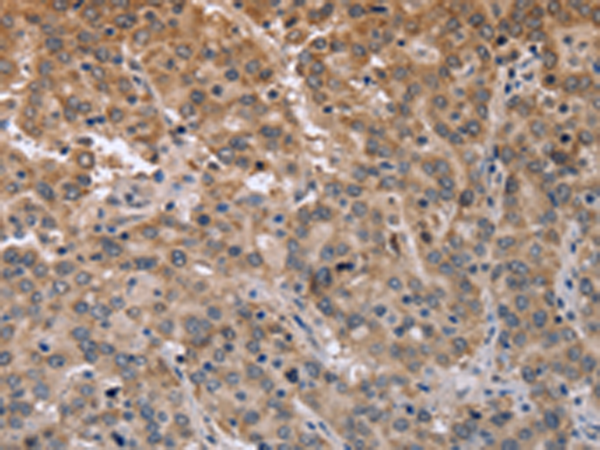


| WB | 咨询技术 | Human,Mouse,Rat |
| IF | 咨询技术 | Human,Mouse,Rat |
| IHC | 1/50-1/200 | Human,Mouse,Rat |
| ICC | 技术咨询 | Human,Mouse,Rat |
| FCM | 咨询技术 | Human,Mouse,Rat |
| Elisa | 1/2000-1/10000 | Human,Mouse,Rat |
| Aliases | ECE |
| WB Predicted band size | 87 kDa |
| Host/Isotype | Rabbit IgG |
| Antibody Type | Primary antibody |
| Storage | Store at 4°C short term. Aliquot and store at -20°C long term. Avoid freeze/thaw cycles. |
| Species Reactivity | Human, Mouse |
| Immunogen | Fusion protein of human ECE1 |
| Formulation | Purified antibody in PBS with 0.05% sodium azide and 50% glycerol. |
+ +
以下是3篇关于ECE1抗体的参考文献及其摘要信息:
---
1. **文献名称**: "Endothelin-Converting Enzyme-1 in Cancer: A Systematic Review"
**作者**: Karamysheva, A.F., et al.
**摘要**: 该研究综述了ECE1在多种癌症(如前列腺癌、乳腺癌)中的表达模式,利用特异性抗体通过免疫组化技术揭示其与肿瘤侵袭性和预后的相关性,提示ECE1可能成为癌症治疗的潜在靶点。
---
2. **文献名称**: "Localization of Endothelin-Converting Enzyme-1 in Human Myocardium Using Monoclonal Antibodies"
**作者**: Xu, D., et al.
**摘要**: 通过开发抗ECE1单克隆抗体,研究者系统分析了其在心力衰竭患者心肌组织中的分布,发现ECE1在心肌细胞和血管内皮中高表达,可能与心脏重构和病理过程相关。
---
3. **文献名称**: "ECE-1 Isoforms Functionally Differ in Hypoxia-Induced Vascular Remodeling"
**作者**: Bagnato, A., et al.
**摘要**: 研究利用ECE1特异性抗体区分不同亚型(ECE-1a/1b/1c),发现其在低氧条件下血管内皮细胞中的差异性表达,表明特定亚型可能在血管生成和肿瘤微环境调控中发挥关键作用。
---
这些文献涵盖了ECE1抗体在癌症、心血管疾病及分子机制研究中的应用,涉及实验技术与病理关联的解析。
ECE1 (Endothelin-converting enzyme 1) is a membrane-bound metalloprotease primarily involved in the biosynthesis of endothelin-1 (ET-1), a potent vasoconstrictor peptide. Discovered in the early 1990s, ECE1 cleaves the inactive precursor big endothelin-1 to produce mature ET-1. which regulates vascular tone, cell proliferation, and hormonal balance. Its expression is observed in endothelial cells, smooth muscle cells, and various tissues, including the lungs, kidneys, and heart. Dysregulation of ECE1 activity has been linked to cardiovascular diseases (e.g., hypertension, pulmonary arterial hypertension), cancer progression, and fibrotic disorders.
ECE1 antibodies are essential tools for detecting and quantifying ECE1 protein levels in research. They enable the study of ECE1's cellular localization, expression patterns, and regulatory mechanisms through techniques like Western blotting, immunohistochemistry, and ELISA. Specific antibodies targeting different ECE1 isoforms (e.g., ECE1a, ECE1b) help clarify isoform-specific functions. Additionally, ECE1 inhibitors are explored as therapeutic agents, making these antibodies critical for validating drug efficacy and target engagement in preclinical models. Recent studies also investigate ECE1's role in tumor angiogenesis and metastasis, expanding its relevance beyond cardiovascular biology. Commercial ECE1 antibodies are typically validated for cross-reactivity and specificity across human, mouse, and rat samples.
×